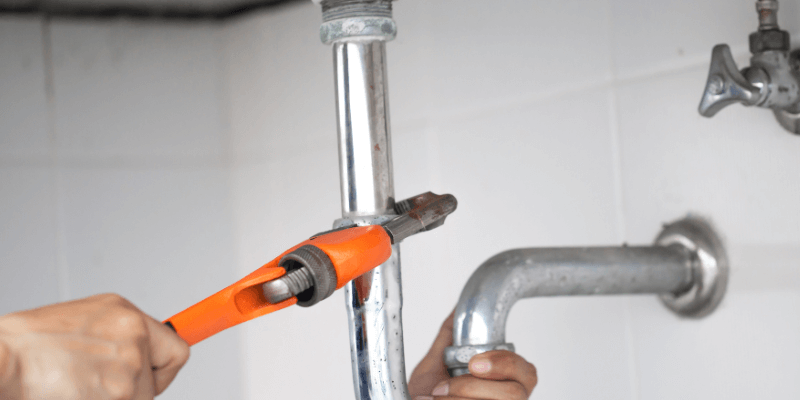How to Become a Plumber

Considering how trade jobs are in high demand these days, becoming a plumber can be a rewarding career. It can offer stability, development opportunities, and a hands-on environment made for those who enjoy problem-solving.
But how do you become a plumber? Whether you’re starting early or considering a job change, understanding essential steps can help you embark on this fulfilling career.
Educational Requirements
To begin your journey as a plumber, a high school diploma or its equivalent is typically required. High school courses that can be particularly beneficial for aspiring plumbers include mathematics, science, and technical education classes, which can lay the groundwork for understanding complex plumbing systems.
Basic computer skills may also advantageous—modern plumbing can involve specialized software and technology. With this core aspect of your education, you can prepare for the next step in your plumbing career: entering an apprenticeship program.
Plumbing Apprenticeship
Like many tradesman positions, an apprenticeship can be a crucial step for those wondering how to become a plumber. These apprenticeships can combine hands-on experience with classroom instruction, which can be helpful for both learning opportunities and boosting your resume. They typically last four to five years, during which apprentices work under the supervision of experienced plumbers who mentor them.
To find an apprenticeship, you can explore options through local trade unions, non-union programs, or plumbing companies. Union apprenticeships often provide comprehensive training and features, while non-union programs may offer more flexible entry requirements. During your apprenticeship, you can gain essential skills, such as pipe installation, system diagnostics, and maintenance, helping to prepare you for a plumbing career.
Licensing and Certification
You may also likely want to make things official by obtaining the necessary licensing and certification. Licensing requirements can vary by state but generally include completing an apprenticeship and passing a licensing exam. This exam may typically cover plumbing codes, system design, and safety practices.
To become a licensed journeyman plumber, you may be required to fulfill your state’s specific requirements, which may include additional coursework or supervised work hours. It may not end there, either—continuing education is often required to maintain your license, helping you stay updated with the latest industry standards and technologies.
Advancing to Master Plumber
Another great thing about trade jobs is that there could be clear growth potential for skills like plumbing. Master plumbers have a high degree of skill and expertise and are often major competitors in their field. To become a master plumber, you usually need several years of experience as a journeyman plumber and pass a rigorous exam that will test your knowledge.
Achieving master plumber status can open up numerous opportunities, including higher earning potential, the ability to run your own plumbing business, and the capacity to supervise and mentor other plumbers. This may not only be a personally fulfilling experience, but it can also help you contribute to the growth and development of the trade.
Skills and Traits for Success
If you’re interested in becoming a plumber, there are some core skills and traits you can develop to help you succeed in this environment. Some key skills include manual dexterity, problem-solving abilities, and effective communication—plumbers often need to clearly explain complex issues to clients. Physical stamina can be another big advantage. The demanding nature of the job, which often involves lifting heavy equipment and working in confined spaces, may call for some fitness.
Aside from these skills, you can also pull ahead in the industry if you can work on certain traits and attitudes. For example, attention to detail matters a great deal given that your work might need to meet precise standards. A strong work ethic is also important, to maintain a reputation for reliability and quality.
Career Prospects and Features
You now know how to become a plumber—but do you know why you should become one? Pursuing a career in plumbing can have a lot of perks. The demand for skilled plumbers can be consistently high, so you likely could have plenty of job opportunities. Plus, plumbers can make quite competitive earnings. Like most jobs, this can vary based on experience, location, and your level of certification.
Plumbers have the option to work for established companies or start their own businesses. Working for a company can provide job security, benefits like health insurance and retirement plans, and paid training opportunities. On the other hand, running your own plumbing business can offer independence, potentially higher earnings, and the flexibility to set your own hours and choose clients.
Help Protect Your Plumbing Business with PolicySweet
Plumbers can have successful and lucrative careers, so if you have an interest in this field, there may be opportunities. If you decide to start your own service, it can be important to get insurance for your business. PolicySweet® offers tailored insurance solutions for small businesses, including Business Owners Policies (BOP) that can cover general liability, business property, and cyber risks. With coverage, you can focus on growing your plumbing business, knowing that you can have the protection you need. Get a quote today to learn more.